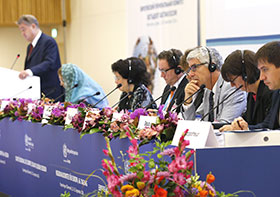Day 4 highlights: countries commit to strengthening the use of evidence and research in policy-making

WHO
On the final day of the 66th session of the WHO Regional Committee for Europe (RC66), Member States adopted a European action plan to strengthen the use of evidence, information and research for policy-making. They also approved an action plan for the prevention and control of noncommunicable diseases (NCDs), which complements global plans and builds on the previous regional strategy.
Proposed WHO programme budget 2018–2019
The WHO Regional Committee for Europe (RC) reviewed the Draft proposed programme budget 2018–2019 in conjunction with a report detailing the WHO European Region’s perspective. This was an opportunity for Member States to provide feedback on the proposed budget, a revised version of which will be reviewed by the WHO Executive Board at its 140th session in January 2017.
An engaging discussion focused on the need to further improve the process of setting priorities and aligning the budget accordingly, as well as the future financing of the budget, especially with regard to the WHO Director-General’s recent call to consider an increase in assessed contributions.
Member States recognized the critical importance of improving the predictability of future financing and expressed their openness to continuing the dialogue. They called on the WHO Secretariat to continue its efforts to improve accountability and transparency, and to further explore possibilities for gains in efficiency.
European action plan for the prevention and control of NCDs
NCDs are still a main cause of mortality and morbidity in the Region, and large inequalities persist both within and between countries. Trends suggest, however, that the Region as a whole will reach its goal of reducing NCDs by 25% by 2025, and that hitting the Sustainable Development Goal target to reduce premature mortality by one third by 2030 is also possible.
To this end, WHO/Europe presented the Action plan for the prevention and control of NCDs in the WHO European Region to Member States. While maintaining the original vision and strategic objectives of the earlier European NCD strategy, the updated Action plan focuses on what is needed to achieve both global and regional targets.
For the first time, it recognizes the impact of shared risk factors and co-morbidities such as oral, musculoskeletal and mental health, and identifies air pollution and infectious diseases as risk factors. The Action plan focuses on a balance of prevention and treatment to reduce premature mortality, and acknowledges the contributions of vaccinations and relevant communicable disease control, treatment and secondary prevention.
Member States strongly supported the resolution and adopted it by consensus.
Progress reports
WHO/Europe removed the presentations on progress reports from the agenda and invited Member States to submit written comments regarding the reports by 21 October 2016. Several Member States spoke in plenary; one appealed to countries to change their practices of antibiotic use for humans and animals and another noted that, thanks to progress in many countries, the elimination of measles and rubella in the Region is achievable.
European action plan to strengthen the use of evidence, information and research for policy-making
The Action plan to strengthen the use of evidence, information and research for policy-making in the WHO European Region calls on Member States to improve their national health information systems and focus on evidence-informed policy-making in all agendas.
Speaking on behalf of the Standing Committee of the Regional Committee, Dr Alexandru Rafila of Romania noted that the Action plan is an innovative, comprehensive and much-needed tool. Several Member States also took the floor to express their support for it. They underlined the importance of strengthening coordination and data harmonization between international organizations, welcomed the Action plan’s emphasis on electronic health and expressed a wish to see more rapid progress. Member States adopted the resolution.
Dates and locations of future RCs
- RC67 will take place in Budapest, Hungary on 11–14 September 2017.
- RC68 will take place in Italy on 17–20 September 2018.
- RC69 will take place in Copenhagen, Denmark on 16–19 September 2019.
Closing of RC66
In her closing comments, WHO Regional Director for Europe Dr Zsuzsanna Jakab noted that the European health policy framework Health 2020 is reinforced by the 2030 Agenda for Sustainable Development. She highlighted that many important decisions on health were reached at RC66 for the benefit of the women, men, children and adolescents of the Region.
The Regional Director thanked Member States, partners and civil society organizations, as well as the Danish Government and WHO/Europe’s patron Her Royal Highness The Crown Princess of Denmark, for their active participation and engagement in this year’s proceedings.
“You have experienced and practiced responsible health diplomacy, and I thank you for your willingness to cooperate in the spirit of consensus. This is the strength of our Regional Committee”, she said.



